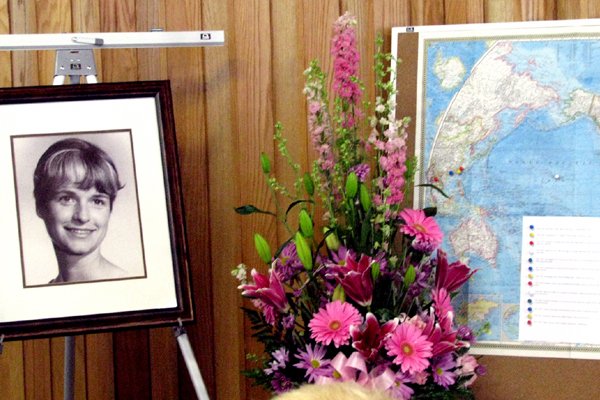Helen Moser held up her beautiful family portrait.
”
This is my daughter here, and here’s my sister … here’s my
other sister, and she’s married to this guy up here
– he used to be a pastor in Los Gatos, but he’s retired now.
Now, can you look at this picture and tell me which two guys are
gay?
”
Helen Moser held up her beautiful family portrait. “This is my daughter here, and here’s my sister … here’s my other sister, and she’s married to this guy up here – he used to be a pastor in Los Gatos, but he’s retired now. Now, can you look at this picture and tell me which two guys are gay?”
It stops Gavilan students in their tracks. “I think it’s this one here in the middle,” one student says, “He looks the most different.”
“Nope,” says Helen, “That’s my son-in-law.”
A number of the students attending the Annual Health Fair gamely give it a try, but not one can guess which two in the family portrait were Helen’s son Mark and which one was his partner, Todd, They both died of AIDS.
This was my introduction to Helen Moser, a most extraordinary woman who lived in Gilroy for more than 20 years. She died Oct. 1, after waging a long battle with Alzheimer’s disease that robbed her of her brilliant and always curious mind.
I got to know her about five years ago when she decided to educate me about the Gavilan Health Fair. Helen was stationed at the table for support group Parents, Families and Friends of Lesbians and Gays.
She was not shy about asking me to help pass out brochures and information about the group. She told me parents call PFLAG in utter panic upon learning their son or daughter is gay or lesbian. The parent needs assurance that it’s not the end of the world and advice on how to handle the situation. When the Fair first started 16 years ago, a student planning to commit suicide attended the event and changed her mind based on the help she received.
After that, Helen never missed a fair.
As I got to know her, I learned Helen had a lifelong history of looking out for all those around her. When Helen was living in Laos as the wife of a diplomat, she discovered locals were suffering from water-borne illnesses. Rather than trying to argue or force changes in the culture, Helen had the brilliant idea of getting a microscope and setting it up in a public place. She displayed a slide with a few drops of water on it. Then she invited everyone to take a look at the magnified bacteria in those drops. In no time, the local population began treating their drinking water to make it safer.
Helen made an impact wherever she lived. And she lived quite a few places – 21 different locations to be exact, from Hereford, Texas, to Taiwan. As the wife of a foreign service diplomat, she raised her four children on the move; she learned to speak Chinese working with cleft palate children in Taiwan; and even played a little ornery man with a straggly beard in a Chinese opera. She never met anyone she couldn’t make instant friends with.
One time in Canada, she was driving along when, lo and behold, she saw parachutists coming down out of the sky in front of the car and decided to stop and get to know them. Her children were mortified. “Please don’t start talking to these strangers!” they cried.
Of course she did, and soon they were chatting like lifelong friends. When one of them peered into the car and asked, “Is this your mom?” one of her children replied, “Oh no, she’s just a hitchhiker we picked up.”
Helen wasn’t mad. She thought it was funny.
“In a way, she was a hitchhiker around the world,” her husband Leo said at Monday’s memorial service. “She was always going someplace new and always asking, ‘Where to next?’ ”
She lived in Hawaii when her husband was political adviser to a top U.S. official. It was her job to entertain and cook gourmet dinners for ambassadors, admirals, generals, senators and presidents.
Helen met Eleanor Roosevelt. She hosted Nikita Krushchev and his wife.
In Moscow, she wasn’t supposed to know the KGB agents assigned to follow her. But she figured out who they were and became friends with them.
“She was a human being in every context,” Leo Moser said. “You couldn’t hire someone to do what she did. I was so proud of her—she was the best representative of an American we could have had in all these different countries.”












